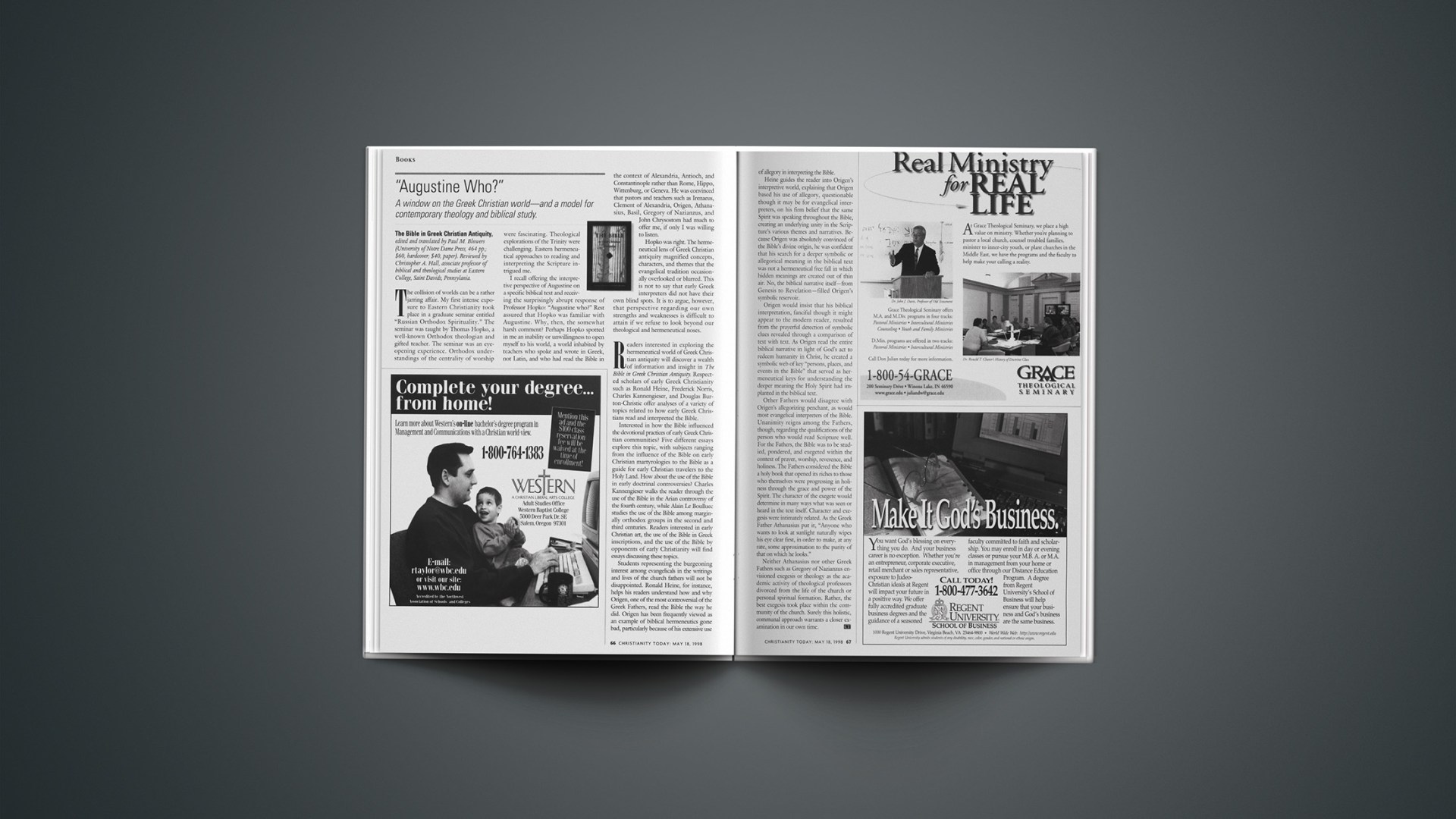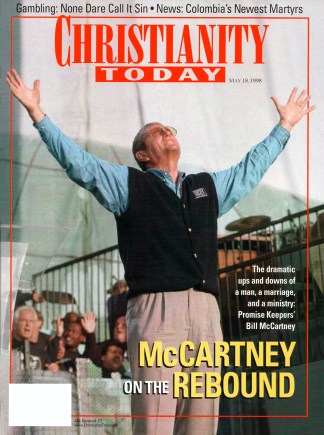The Bible in Greek Christian Antiquity, edited and translated by Paul M. Blowers (University of Notre Dame Press, 464 pp.; $60, hardcover; $40, paper). Reviewed by Christopher A. Hall, associate professor of biblical and theological studies at Eastern College, Saint Davids, Pennsylania.
The collision of worlds can be a rather jarring affair. My first intense exposure to Eastern Christianity took place in a graduate seminar entitled “Russian Orthodox Spirituality.” The seminar was taught by Thomas Hopko, a well-known Orthodox theologian and gifted teacher. The seminar was an eye-opening experience. Orthodox understandings of the centrality of worship were fascinating. Theological explorations of the Trinity were challenging. Eastern hermeneutical approaches to reading and interpreting the Scripture intrigued me.
I recall offering the interpretive perspective of Augustine on a specific biblical text and receiving the surprisingly abrupt response of Professor Hopko: “Augustine who?” Rest assured that Hopko was familiar with Augustine. Why, then, the somewhat harsh comment? Perhaps Hopko spotted in me an inability or unwillingness to open myself to his world, a world inhabited by teachers who spoke and wrote in Greek, not Latin, and who had read the Bible in the context of Alexandria, Antioch, and Constantinople rather than Rome, Hippo, Wittenburg, or Geneva. He was convinced that pastors and teachers such as Irenaeus, Clement of Alexandria, Origen, Athanasius, Basil, Gregory of Nazianzus, and John Chrysostom had much to offer me, if only I was willing to listen.
Hopko was right. The hermeneutical lens of Greek Christian antiquity magnified concepts, characters, and themes that the evangelical tradition occasionally overlooked or blurred. This is not to say that early Greek interpreters did not have their own blind spots. It is to argue, however, that perspective regarding our own strengths and weaknesses is difficult to attain if we refuse to look beyond our theological and hermeneutical noses.
Readers interested in exploring the hermeneutical world of Greek Christian antiquity will discover a wealth of information and insight in The Bible in Greek Christian Antiquity. Respected scholars of early Greek Christianity such as Ronald Heine, Frederick Norris, Charles Kannengieser, and Douglas Burton-Christie offer analyses of a variety of topics related to how early Greek Christians read and interpreted the Bible.
Interested in how the Bible influenced the devotional practices of early Greek Christian communities? Five different essays explore this topic, with subjects ranging from the influence of the Bible on early Christian martyrologies to the Bible as a guide for early Christian travelers to the Holy Land. How about the use of the Bible in early doctrinal controversies? Charles Kannengieser walks the reader through the use of the Bible in the Arian controversy of the fourth century, while Alain Le Boulluec studies the use of the Bible among marginally orthodox groups in the second and third centuries. Readers interested in early Christian art, the use of the Bible in Greek inscriptions, and the use of the Bible by opponents of early Christianity will find essays discussing these topics.
Students representing the burgeoning interest among evangelicals in the writings and lives of the church fathers will not be disappointed. Ronald Heine, for instance, helps his readers understand how and why Origen, one of the most controversial of the Greek Fathers, read the Bible the way he did. Origen has been frequently viewed as an example of biblical hermeneutics gone bad, particularly because of his extensive use of allegory in interpreting the Bible. Heine guides the reader into Origen’s interpretive world, explaining that Origen based his use of allegory, questionable though it may be for evangelical interpreters, on his firm belief that the same Spirit was speaking throughout the Bible, creating an underlying unity in the Scripture’s various themes and narratives. Because Origen was absolutely convinced of the Bible’s divine origin, he was confident that his search for a deeper symbolic or allegorical meaning in the biblical text was not a hermeneutical free fall in which hidden meanings are created out of thin air. No, the biblical narrative itself-from Genesis to Revelation-filled Origen’s symbolic reservoir.
Origen would insist that his biblical interpretation, fanciful though it might appear to the modern reader, resulted from the prayerful detection of symbolic clues revealed through a comparison of text with text. As Origen read the entire biblical narrative in light of God’s act to redeem humanity in Christ, he created a symbolic web of key “persons, places, and events in the Bible” that served as hermeneutical keys for understanding the deeper meaning the Holy Spirit had implanted in the biblical text.
Other Fathers would disagree with Origen’s allegorizing penchant, as would most evangelical interpreters of the Bible. Unanimity reigns among the Fathers, though, regarding the qualifications of the person who would read Scripture well. For the Fathers, the Bible was to be studied, pondered, and exegeted within the context of prayer, worship, reverence, and holiness. The Fathers considered the Bible a holy book that opened its riches to those who themselves were progressing in holiness through the grace and power of the Spirit. The character of the exegete would determine in many ways what was seen or heard in the text itself. Character and exegesis were intimately related. As the Greek Father Athanasius put it, “Anyone who wants to look at sunlight naturally wipes his eye clear first, in order to make, at any rate, some approximation to the purity of that on which he looks.”
Neither Athanasius nor other Greek Fathers such as Gregory ofNazianzus envisioned exegesis or theology as the academic activity of theological professors divorced from the life of the church or personal spiritual formation. Rather, the best exegesis took place within the community of the church. Surely this holistic, communal approach warrants a closer examination in our own time.










